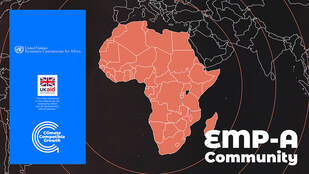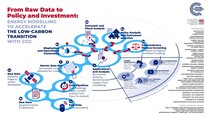A Community of Practice

The EMP-Africa Community of Practice is housed on LinkedIn. It includes hundreds of leading analysts, many of whom are African and have contributed to the EMP-A's growing body of knowledge. Content ranges from data, to investment, to political economy analytics. Join us: https://www.linkedin.com/groups/12738562/
An Annual African School
Now in its 5th installment the EMP-A2023 will be held in Namibia. Please click here for more info. Each year it is held at a leading university or African center. Past hosts have included: UNECA in Addis; University of Cape Town; University of Mauritius. The school is free, thanks to generous funding of partners. However, competition is very high.
Applications for 2023 are now open here.
Applications for 2023 are now open here.
Online teaching material, self study courses and open-source software

Free software, teaching material and courses are available online at Open Learn Create. You can take the courses directly, incorporate them into teaching, technical-assistance, knowledge management & on-baroding programs. Its all under a creative commons licence - so please do use it as helpful:
- Energy balances, demand assessment and scenarios: In this course, participants will learn about energy system analysis and how to use Energy Balance Studio (EBS) and the Model for Analysis of Energy Demand (MAED)
- OnSSET/The Global Electrification Platform. In this course, participants will learn about geospatial energy modelling in the tools Open Source Spatial Electrification Tool (OnSSET) and World Bank’s Global Electrification Platform.
- Energy and Flexibility Modelling: OSeMOSYS & FlexTool (Windows & Mac) Participants will learn to use energy modelling tools to understand the investments needed to meet growing energy demands alongside environmental and energy security constraints, while assessing system flexibility to account for high renewables penetration.
- Agent-based energy systems modelling: MUSE. This course will help participants understand the types of investments that could be made to ensure a sustainable and secure energy system from a global or national perspective using an agent-based methodology.
- Infrastructure and Climate Resilience. This course is centred around the role that infrastructure systems play in enabling climate-compatible and sustainable development in an uncertain future, providing the latest science and tools in this field.
- Introduction to integrated modelling of Climate, Land, Energy and Water systems (CLEWs) for sustainable development policy.
- Financial modelling to support the planning (FinPlan) of energy projects that achieve sustainable development outcomes.
- Political Economy of Energy Planning. This exciting course is under review and will be launched shortly.
Model-ready 2022 Starter Data Kits

Access open Energy Data sets and Starter OSeMOSYS models for all continental African countries:
Starter-Kits under construction include: Mauritius please contact (Dr B Hassen).
- Peer reviewed publication. Allington et al 2021. Selected Starter Data Kits.
- Pre-print. Cannone et al 2022. A guide for creating a Starter Data Kit.
- Access to clickable papers, data-tables & models.
- Transport Data-Kits & Commons for info please contact (Dr. J Dixon, Oxford)
- Materials Data-Kits for info please contact (Dr K. Cervantes-Barron, Cambridge)
- Critical Infrastructure Data-Kits for info please contact (Dr R. Pant, Oxford)
- Integrated assessment modelling (IAM) of Climate, Land, Energy, Water (CLEWs) contact (Dr F Gardumi, KTH)
Starter-Kits under construction include: Mauritius please contact (Dr B Hassen).
An African Body of Knowledge
- Special Issue of the EMP-Africa 2020. Energy Systems Modelling for Planning in Africa and Small Island Countrieswww.sciencedirect.com/journal/energy-strategy-reviews/special-issue/10HKM43W6X6.Edited by Obindah Gershon (Nigeria), Jarrad Wright (South Africa), Dinesh Surroop (Mauritius).
Modeling (independent studies that reference tools for which the #EMPA provides training and support)
- Dioha, MO (December 2017). “Energy system models for sub-Saharan African countries: a systematic review” 2. Journal of Sustainable Energy. 8 (4): 159–168. ISSN 2067-5534.
- Musonye, Xavier S, Brynhildur Davíðsdóttir, Ragnar Kristjánsson, Eyjólfur I Ásgeirsson, and Hlynur Stefánsson (August 2020). “Integrated energy systems modeling studies for sub-Saharan Africa: a scoping review”. Renewable and Sustainable Energy Reviews. 128: 109915. ISSN 1364-0321. doi:10.1016/j.rser.2020.109915.
Cameroon
- Ouedraogo, Nadia S (1 January 2023). “A GIS approach to electrification planning in Cameroon”. Energy Strategy Reviews. 45: 101020. ISSN 2211‑467X. doi:10.1016/j.esr.2022.101020.
- Rady, Yassin Yehia, Matteo V Rocco, MA Serag-Eldin, and Emanuela Colombo (15 December 2018). “Modelling for power generation sector in developing countries: case of Egypt”. Energy. 165: 198–209. ISSN 0360-5442. doi:10.1016/j.energy.2018.09.089.
- Boke, Megersa Tesfaye, Semu Ayalew Moges, and Zeleke Agide Dejen (14 January 2022). “Optimizing renewable-based energy supply options for power generation in Ethiopia”. PLOS ONE. 17 (1): 0262595. ISSN 1932-6203. doi:10.1371/journal.pone.0262595. CC‑BY‑4.0 license.
- Mekonnen, Tewodros Walle, Solomon Tesfamariam Teferi, Fitsum Salehu Kebede, and Gabrial Anandarajah (January 2022). “Assessment of impacts of climate change on hydropower-dominated power system — the case of Ethiopia”. Applied Sciences. 12 (4): 1954. ISSN 2076-3417. doi:10.3390/app12041954. CC‑BY‑4.0 license.
- Yalew, Amsalu Woldie (18 February 2022). “The Ethiopian energy sector and its implications for the SDGs and modeling”. Renewable and Sustainable Energy Transition. 2: 100018. ISSN 2667-095X. doi:10.1016/j.rset.2022.100018. CC‑BY‑4.0 license.
- Awopone, Albert K, Ahmed F Zobaa, and Walter Banuenumah (2017). “Assessment of optimal pathways for power generation system in Ghana”. Cogent Engineering. 4 (1): 1314065. doi:10.1080/23311916.2017.1314065. CC‑BY‑4.0 license.
- Akute, Michelle and Carla Cannone (9 December 2022). Effects of switching from biomass stoves to electric stoves and subsequent reduction in resultant emissions in the Kenyan energy sector — Preprint. ResearchSquare. doi:10.21203/rs.3.rs-2353038/v1.
- Bahetta, Soufiyan and Rachid Hasnaoui (July 2021). “Analyses of optimum production scenarios for sustainable power production in Morocco”. Review of Economics and Finance. 19 (1): 184–195. Open access. HAL landing page.
- Bahetta, Soufiyan, Nabil Dahhou, and Rachid Hasnaoui (25 October 2021). “Comparative effectiveness of environmental regulation instruments: case of the Moroccan electricity mix”. AIMS Energy. 9 (5): 1097–1112. doi:10.3934/energy.2021050. CC‑BY‑4.0 license.
- Isihak, Salisu, Uduak Akpan, and Subhes Bhattacharyya (19 February 2022). “Evolution of GIS-based rural electrification planning models and an application of OnSSET in Nigeria — Official pre‑proof”. Renewable and Sustainable Energy Transition. 100019. ISSN 2667-095X. doi:10.1016/j.rset.2022.100019.
- Isihak, Salisu R (1 January 2023). “Achieving universal electricity access in line with SDG7 using GIS-based model: an application of OnSSET for rural electrification planning in Nigeria”. Energy Strategy Reviews. 45: 101021. ISSN 2211‑467X. doi:10.1016/j.esr.2022.101021.
- Ayagapin, Leslie, Jean Philippe Praene, Doorgeshwaree Jaggeshar, and Dinesh Surroop (January 2021). “Prospective life cycle assessment: effect of electricity decarbonization in building sector”. Energies. 14 (11): 3184. ISSN 1996-1073. doi:10.3390/en14113184. CC‑BY‑4.0 license.
- Esso-Wazam Honoré Tchandao. Modelling the electricity mix for Togo by 2050 using OSeMOSYS, 21 December 2022, PREPRINT (Version 1) available at Research Square [https://doi.org/10.21203/rs.3.rs-2394333/v1]
- Dhakouani, Asma, Francesco Gardumi, Essia Znouda, Chiheb Bouden, and Mark Howells (15 December 2017). “Long-term optimisation model of the Tunisian power system”. Energy. 141: 550–562. ISSN 0360-5442. doi:10.1016/j.energy.2017.09.093.
- Dhakouani, Asma, Essia Znouda, and Chiheb Bouden (1 October 2019). “Impacts of energy efficiency policies on the integration of renewable energy”. Energy Policy. 133: 110922. ISSN 0301-4215. doi:10.1016/j.enpol.2019.110922.
- Dhakouani, Asma, Essia Znouda, and Chiheb Bouden (2020). Impacts of electricity subsidies policy on energy transition. In Qudrat-Ullah and Asif (editors). Dynamics of energy, environment and economy: a sustainability perspective. Cham, Switzerland: Springer International Publishing. ISBN 978-3-030-43578-3. doi:10.1007/978-3-030-43578-3_4.
- Gardumi, Francesco, Nesrine Mhiri, Mark Howells, Franziska Bock, Thameur Necibi, and Chiheb Bouden (1 November 2021). “A scenario analysis of potential long-term impacts of COVID-19 on the Tunisian electricity sector”. Energy Strategy Reviews. 38: 100759. ISSN 2211-467X. doi:10.1016/j.esr.2021.100759. CC‑BY‑4.0 license.
- Nyoni, Kumbuso Joshua (13 December 2022). The Zambian Energy Transition (ZET): a case study for OSeMOSYS and FlexTool — Preprint. ResearchSquare. doi:10.21203/rs.3.rs-2368899/v1 1.
- Tembo, Bernard (January 2018). Strategic investment decisions in Zambia’s mining sector under a constrained energy system. PhD thesis. London, United Kingdom: University College London (UCL).
Partners
African Centers of Excellence: UN ECA training institute (IDEP) Dakar, University of Cape Town, University of Mauritius, Pan African University
Other partners: UNDESA, UNDEP, UNECA, IAEA, WBG, ESMAP, IADB, IEA, IRENA, ICTP, Imperial College London, Loughborough University, Oxford University, Cambridge University, University College London, Royal Institute of Technology (KTH, Sweden), Open University, Simon Fraser University, Cyprus Institute of Technology, the University of Costa Rica and others
African Centers of Excellence: UN ECA training institute (IDEP) Dakar, University of Cape Town, University of Mauritius, Pan African University
Other partners: UNDESA, UNDEP, UNECA, IAEA, WBG, ESMAP, IADB, IEA, IRENA, ICTP, Imperial College London, Loughborough University, Oxford University, Cambridge University, University College London, Royal Institute of Technology (KTH, Sweden), Open University, Simon Fraser University, Cyprus Institute of Technology, the University of Costa Rica and others

